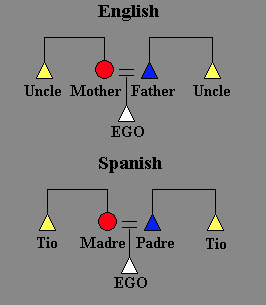You are 10 years old again, and you’re at the grocery store with your mom. The reese’s pieces in aisle 4 caught your eye, but just for a second. You turn around to ask your mom to if you are allowed to get them, but she has disappeared. Frantically, you call out, “Mom!”, but you recoil when nearly every woman in sight turns to find out who was calling their name.
If you wanna talk about ambiguity, the term ‘mom’ pretty much nails it. Did you ever think how strange it is that nearly everyone in the english speaking language refers to their mother by the exact same name? Even more odd: the name ‘mom’ (ok, slight variations of the name) are common across many languages and cultures.
It’s hard to talk in terms of genealogy (or, the study of family history) without using terms of kinship, such as father, auntie or grandma. These words are crucial in describing blood relations to each other; ultimately, terms of kinship are the foundation when constructing family trees. However, these terms often translate very differently in terms of phonetics. For example, in English we refer to the brother of our father as ‘uncle’, whereas in Spanish he is referred to as ‘tío’. You see, these two words do not look or sound the same. However, there is something about the term mother that is all too similar across many languages….
In German, they say ‘mutter’. In Afrikaans, it’s ‘moeder’. Swahili? Mama. Catching the drift?
So how did the kinship term ‘mother’ turn out to be so phonetically similar across cultures? Most experts have landed on an explanation provided by Roman Jakobson, and it goes like this:
“Often the sucking activities of a child are accompanied by a slight nasal murmur, the only phonation which can be produced when the lips are pressed to mother’s breast or to the feeding bottle and the mouth full. Later, this phonatory reaction to nursing is reproduced as an anticipatory signal at the mere sight of food and finally as a manifestation of a desire to eat, or more generally, as an expression of discontent and impatient longing for missing food or absent nurser, and any ungranted wish”
I mean, that makes perfect sense, right? But what if I told you that Jakobson presented these findings in 1962, over 50 years ago. The literature on this specific topic hardly goes past the early 90’s, and while Jakobson’s explanation may seem to be bang-on, I am curious if the scientific community has not questioned this explanation thoroughly enough; the biggest flaw I see is how this accounts for all the languages that do not have a phonetically similar variant of ‘mother’.
While some are ready to mark this topic case-closed, I would prefer to leave it open to allow the scientific community to explore it a little longer.
-Steph Schaupmeyer


4 responses to “Why you (and everyone else…) call her ‘mom’”